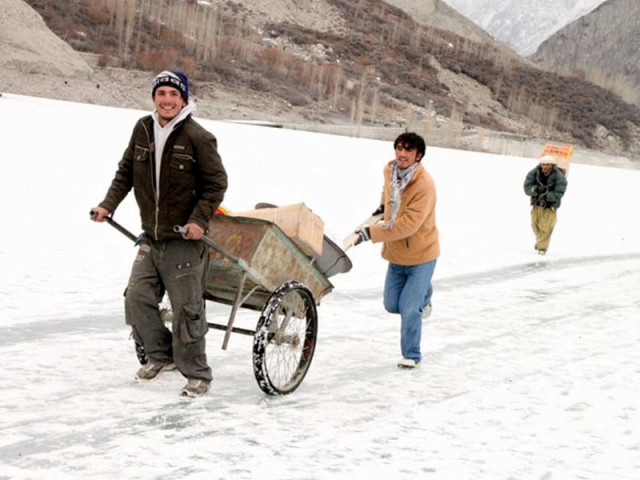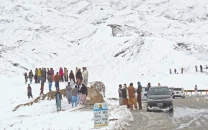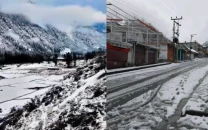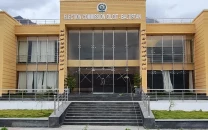Attabad disaster anniversary: The ‘dam’ nobody is talking about
Days before the second anniversary, Gojalis to protest nationwide to have concerns addressed.

As the second anniversary of Attabad landslide approaches, Gojalis have come to believe that a nationwide agitation is the only way they will be able to get the authorities’ attention.
The Attabad Lake formed when a massive landslide on January 4, 2010 struck the small hamlet of Attabad, killing 19 people. The lake has consumed at least four villages upstream since then and has expanded. The dam still threatens three dozen villages downstream if it is breached.
The government promised to have the 23-km-long lake drained by the summer of 2010, but two years later the lake is still as it was, with more than 25,000 people living in Upper Hunza Valley, or Gojal, cut off and Pak-China trade badly affected.
Aziz Ahmed, a member of the anniversary organising committee, said, “It appears that there is no end in sight to our miseries, so we plan to knock the door of everyone we can for the resolution of this critical issue.”
He said that they want the task of draining the lake to be assigned to a company other than the Frontier Works Organisation (FWO).
Ahmed claimed that the lake could be drained within two months if the task was given to a Chinese firm, but accordingly to FWO, a team of World Bank experts, Dr Richard Hughes, Dr David Petlay and Allessandro Palinieri, visited the site on March 11, 2010 to conduct a technical evaluation and suggest modalities to tackle the catastrophe. The team fully endorsed the plan proposed by Pakistan Army and NESPAK experts to tackle the catastrophe.
But Ahmed is still apprehensive. “The lake has crushed the local economy.”
Following the submerging of a 25 km patch of the KKH, Pakistan’s trade with China suffered, and whatever volume of trade continues is only taking place using boats. Traders load goods on to boats in Gulmit and offload them in Attabad. The goods are then delivered to other parts of the country.
With trade disrupted, China has twice provided consignments of relief goods to the victims of Attabad Lake since the tragedy, Ahmed said.
However, the situation in Gojal valley has deteriorated further since the temperature plummeted and the water turned into ice, making the voyage near impossible. “Just imagine the condition of the passengers, especially women and children and the sick and elderly, who are forced to travel in open boats in this freezing weather,” a passenger said.
Earlier this week, the district government placed a ban on boat travel through Attabad Lake, but local boat owners defied the ban, despite the threat to life and limb.
The people believe that by highlighting the issue on the second anniversary of the catastrophe, they will be able to pressure the government into having the lake drained. Success, or lack thereof, could define the region’s future.
Published in The Express Tribune, December 28th, 2011.


















COMMENTS
Comments are moderated and generally will be posted if they are on-topic and not abusive.
For more information, please see our Comments FAQ